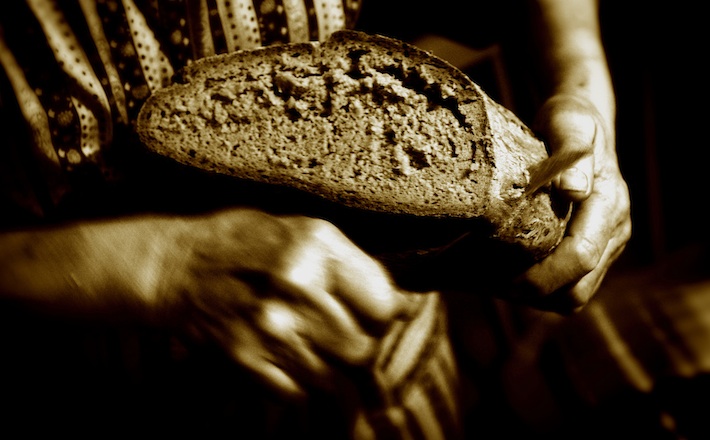Commentary on Psalm 78:23-29
Psalm 78 is the second longest psalm in the Psalter (next to Psalm 119) and by far the longest psalm that rehearses Israel’s history (Psalms 105 and 106 are two other examples).
The events of the past are presented as a lesson for the present generation. The period of wilderness wandering is the focus. God rescued the Israelites from Egypt (vv. 12-13) and led them safely through the wilderness (vv. 14-16). The psalm is for “teaching” (v. 1), a “parable” (v. 2) of what God has done for Israel’s ancestors so members of the present generation may “set their hope in God, and not forget the works of God” (v. 7).
The section of the psalm set apart in the lectionary reading has a distinct place in this poetic report of Israel’s past. Verses 23-29 appear within a larger section that reports God’s anger over Israel’s rebellion and lack of faith (vv. 21-22 and the larger account in vv. 9-22). In fact, the psalm in some ways is dominated by this theme. As the account of the ancestors unfolds, it goes quickly to their rebellion so the present generation “should not be like their ancestors” whose “heart was not steadfast” (v. 8). The Israelites of the past “refused to walk according to his law” (v. 10). The entire psalm is thus punctuated by this characterization of the forebears in faith who failed in their walk with God: “they tested God” (v. 18); “they spoke against God” (v. 19); “they had no faith in God” (v. 22). After the lectionary section there will be more of this: “they tested God again” (v. 41); “they did not keep in mind his power” (v. 42); “they tested the Most High God, and rebelled against him” (v. 56). Thus, the upshot of the historical recollection is that the ancestors were faithless and those reading the psalm now should see the ancestors as a negative example and live differently.
Despite this extensive denunciation of the Israelites from the past, the psalm as a whole accents God’s grace and faithfulness. The larger point is really that the present community of faith should remember God’s goodness. Indeed, the ancestors’ lack of faith is set in contrast to God’s constant faith and continuous acts of salvation, and this is the focus on verses 23-29.
Verse 23 in Hebrew begins with a conjunction-verb combination that communicates simple action in past time and action that follows upon the action of the previous verb. The relationship of the opening verb of verse 23 to the previous verb is rightly communicated by NRSV: “they had no faith in God, and did not trust his saving power” (v. 22); “yet he commanded the skies above, and opened the doors of heaven” (v. 23).
The verses that follow rehearse the story of God’s provision of manna and quail in the wilderness reported in Exodus 16. Although verses 23-29 are inspired by the Exodus story, however, the psalmist describes the food provided and the manner in which it came to the Israelites with poetic flourish. The manna “rained down” (v. 24), and “mortals ate the bread of angels” (v. 25). Similarly, the psalmist declares concerning God’s provision of the birds that “he rained flesh upon them” (v. 27). The psalmist also emphasizes the abundance of what was provided. God sent them “food in abundance” (v. 25); “he rained flesh upon them like dust, winged birds like the sand of the seas” (v. 27). The constant unfaithfulness of the Israelites is matched by God’s superabundant provision for them. The impact of verses 23-29 therefore is an overwhelming sense of Israel’s foolishness on the one hand and of God’s goodness on the other hand.
In order to capture fully the message of verses 23-29 it is crucial to acknowledge what comes immediately after, in verses 30-31. Following the report of God giving bread and flesh in the wilderness the psalmist recalls that “while the food was still in their mouths” (v. 30) “the anger of God arose against them and he killed the strongest of them” (v. 31). Although this may sound like a contradiction to God’s earlier provision, it actually reinforces the point about God’s care for the Israelites. God’s purpose with the Israelites in the wilderness was not just to feed them, but to make them a faithful and obedient people. God’s punishment of them was, like the provision of food, meant to draw them back into relationship with the one who brought them out of Egypt. This is apparent in two ways in Psalm 78. First, Israel’s response to God’s punishment was ultimately the same as it was to God’s provision of food: “they still sinned” (v. 32). Second, the remainder of the psalm (after vv. 30-31) reinforces the message about God’s grace that appears in verses 23-29. While the Israelites repeatedly fell away from God’s grace (for example, vv. 36-37), God time and again responded with compassion. Verses 38-39 captures well the overarching mercy of God: “yet he, being compassionate, forgave their iniquity, and he did not destroy them” (v. 38). Indeed, “he remembered that they were but flesh” (v. 39).
This highlight of God’s grace also pervades the rest of the psalm and forms the real point: “he remembered that they were but flesh, a wind that passes and does not come again” (v. 39). The lectionary reading nicely encapsulates this point about the nature of God and of the humans God calls into covenant. Humans are “but flesh,” and are bent toward sinning and toward rejecting the One who saves them, but God is merciful and gracious and offers the rebellious creatures every good thing. This message is particularly suited to the season after Pentecost when the church celebrates being empowered by the Spirit to proclaim the good news. Psalm 78:23-29 expresses the good news as profoundly as any Old Testament text.


August 2, 2015